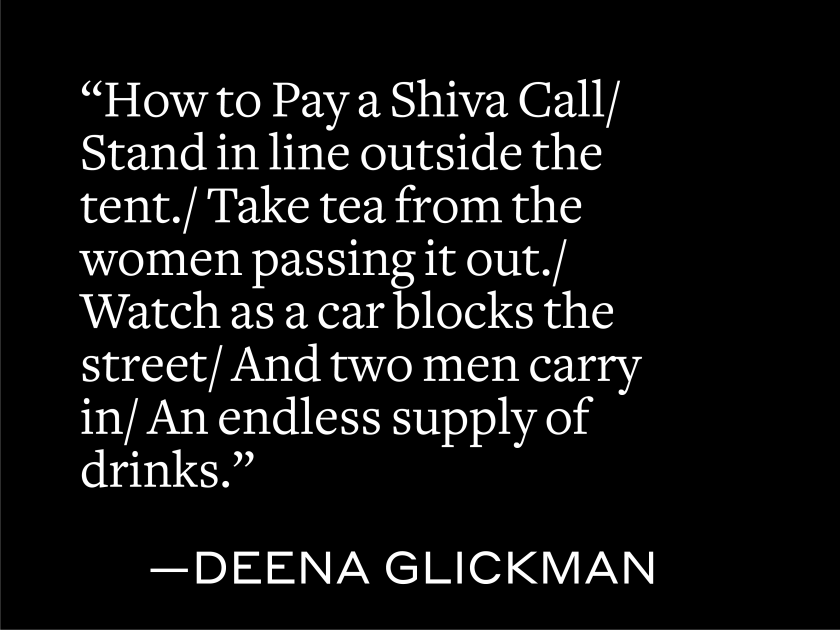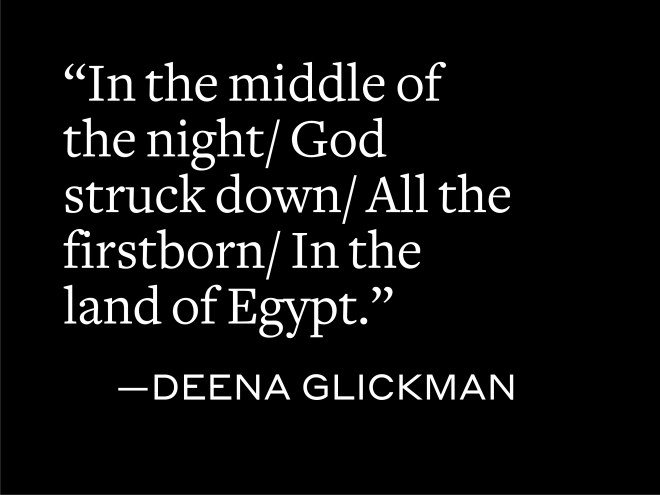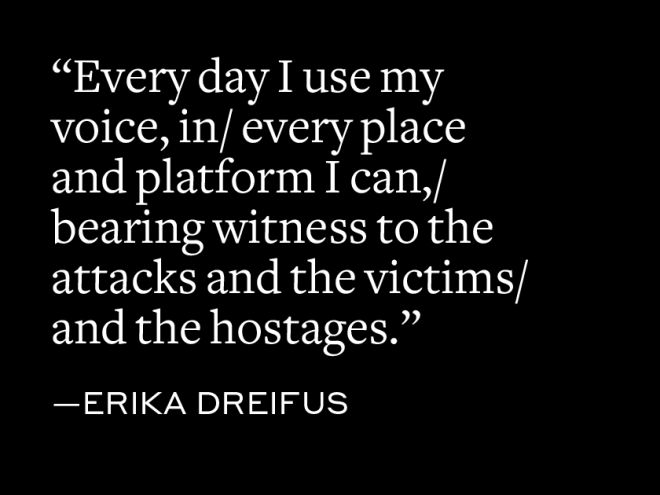
This piece is part of our Witnessing series, which shares pieces from Israeli authors and authors in Israel, as well as the experiences of Jewish writers around the globe in the aftermath of October 7th.
It is critical to understand history not just through the books that will be written later, but also through the first-hand testimonies and real-time accounting of events as they occur. At Jewish Book Council, we understand the value of these written testimonials and of sharing these individual experiences. It’s more important now than ever to give space to these voices and narratives.
In collaboration with the Jewish Book Council, JBI is recording writers’ first-hand accounts, as shared with and published by JBC, to increase the accessibility of these accounts for individuals who are blind, have low vision or are print disabled.
How to Shower
Select a time
When there’s another adult in the house
Or your children are awake.
Clothes should be sitting
Right next to the shower.
Do not remove your lenses.
Make sure your phone is nearby,
With the sound turned up.
Step in:
Soap, shampoo, conditioner, exit.
No checking messages
Or applying moisturizer
While you’re still in your towel.
Ninety seconds is plenty of time.
It’s enough time to throw on clothes,
Or wake four children.
It’s enough time
To close the hallway doors
And the shutters in the living room
And even bring in a chair or two.
Ninety seconds is plenty.
How to Drive a Car
When your phone rings
On the way to football practice,
And your sister tells you
That everyone you know is safe
But you should please call back, and soon,
Your blood runs cold.
You have to remember:
Put your foot on the gas pedal.
Stay in the lane.
Where do you turn?
You’ve driven this maybe fifty times.
Where do you turn?
You have to remember:
Crack jokes with the girls.
It’s funny to talk about Coach
And to plan making sweatshirts that say “Catch, then run!”
It’s funny to tell stories
About missed passes
And to plan out silly names for suicides and planks.
You have to remember to breathe
And that your stomach, tied up in knots,
Can’t fall out of your body.
In twenty minutes,
When you drop them off,
You’ll know whatever there is to know.
Twenty minutes.
You can remember how to drive for twenty minutes.
How to Pay a Shiva Call
Stand in line outside the tent.
Take tea from the women passing it out.
Watch as a car blocks the street
And two men carry in
An endless supply of drinks.
Do not eavesdrop on the teenager
Sitting in a circle with her friends,
Talking about her brother.
Do not look at your phone.
Do not cry.
Inch slowly forward.
You can inch forward that way
For forty-five minutes,
Silent.
Eat a pretzel;
Women are walking around offering:
Please say a blessing.
Inch slowly forward.
Don’t eavesdrop on the two women standing in front of you.
Is that the mother?
Where is the father?
Which ones are sisters?
Inch slowly forward
The mother is standing.
She smiles as she received people.
Inch slowly forward.
It’s almost your turn.
What can you possibly say?
I’m your neighbor.
She hugs you.
Min hashamayim tenuchamu.
May the heavens console you.
How to Pray
You can’t remember a time when you didn’t pray.
It was an imperative from the time you were small,
And as you grew, it waxed and waned,
Longer, shorter, more meaningful and less.
Prayer has always been your few minutes of calm, quiet,
Even when children interrupt your silence
To ask whether there’s an open box of cereal
Or if you can add time to their phone limits.
Once war begins, though,
Your prayer evolves:
The prayer you used to say
That you lost when the kids were born—
You add it back in.
On the first night of the war,
You receive a printable page
With extra prayers.
Your sister starts a Psalms group,
And you say a few every day.
On the second day of the war,
You decide
To read all of the Psalms on your own as well,
So you add two or three when you can,
Sitting at your kitchen table,
Reading glasses on your face,
Struggling through often unfamiliar words.
And then there’s the Amidah,
The central pillar of prayer.
You always add the names of people in need of healing,
And now the healing blessing
Is overrun by soldiers with missing limbs
And unrecognizable faces.
The blessing for rain
Now includes words that ask
For the protection of the soldiers from rain
Even as it asks for rain for the fields,
Woefully untended as people have run for their lives
Or are standing on the frontlines instead of farming.
But it is the final blessing
Of the Amidah’s central section
That has changed the most.
In it,
You have added the names
Of the missing and soldiers.
You cannot pray for all of the missing;
You remember three names—
The elderly relative,
The boy from the neighborhood,
One more boy everyone seems to know—
And you beg God for their safe return, along with the others.
You cannot pray for all of the soldiers;
You only remember the names
Of your nephews, nieces, cousins, neighbors.
You struggle to keep them in some sort of order.
Do you begin with the oldest?
With the one who is deep inside the war zone?
With the ones who have seen so much
That you fear they will never recover?
Your prayer seems to get longer and longer.
You cry, sometimes, during the Psalms,
Or as you struggle to remember names.
Prayer encompasses so much, you think:
Gratitude, petition, grief.
But you still have not found the prayer that asks:
How could You?
How to Sleep
First, do not read the news.
For four or five hours before you get into bed,
The only things you can see on your phone
Are old Hallmark movies,
Snippets of Say Yes to the Dress,
Therapists discussing Disney films.
Do not watch the news on TV,
Or read social media.
When you finally do get into bed,
Try to read or watch inane things
Until you fall asleep of boredom or exhaustion.
If you must fall asleep without distraction,
Remember to push down your shoulders,
Hunched up to your ears most of the day,
Unclench your jaw,
Relax the muscles in your face.
Years ago, when the three boys were missing,
Before you knew for certain that they had been murdered,
You realized that you were lying in bed,
Your eyebrows furrowed,
Your eyes squeezed tight,
Your cheeks held strong.
You had to learn to let them go.
These nights,
You suffer from resting devastated face;
Around the country and the world,
Other people lie awake in bed like you,
Eyes squeezed shut,
Jaws clenched.
If you can remember
Not to read news
Not to squeeze tight all the muscles of your face
Not to think about the world around you,
Maybe,
Maybe
You can sleep.
How to Take Challah
Prepare your dough on Thursday—
Fifteen hundred grams at least—
And leave it in the fridge overnight;
On Friday morning, place it somewhere warm.
When it has risen,
Wake your daughter,
The braiding prodigy;
You will need her to shape the challot.
Pull off a piece and roll it into a ball.
State: This is challah.
Say the blessing:
Blessed are You, God, Master of the universe, who has sanctified us with His commandments, and instructed us to separate challah.
Take a moment to ask God for the important things.
God, say, please return the hostages.
Hold the pages you have printed
With two hundred and forty names.
Read the names, one at a time.
It shouldn’t take long;
You can read two hundred and forty names.
One at a time.
Why are there so many?
Keep reading as your eyes fill,
As you trip over the names and blink and swallow hard,
As your twelve-year-old puts a hand on your arm.
God, why doesn’t it end?
How to Wait
They will call their parents
And tell them that their phones will be off.
Their parents will tell you.
You will take a deep breath
And steady your voice as you speak.
Their phones may be off for days or weeks.
You will hold that breath for as long as their phones are off,
One breath for each soldier.
You will hold that breath as you check in with their parents,
Calling with a smile
Or writing a quick “How are you doing?”
Never ask.
They will tell you when there’s something to know.
Go through the motions—
Make meals, run the dishwasher, fold laundry, do work—
With your breath held.
Walk through life underwater.
One day, if you are lucky, you will receive a short message.
It will say “He’s out” or “She called.”
And you will let go of that one breath
And feel your chest collapse into your body.
How to Find Words
For the first few weeks,
You will search for the right words.
Inhumane? Inhuman? Subhuman?
Brutal? Violent?
Unthinkable? Unfathomable?
Animal and monster are too slight;
Almost cartoonish.
Soulless seems right, but not active enough.
Heinous, merciless, heartless—
These are words you use for those who are
Casually violent, flippant in their brutality.
What do you call
Those who would gleefully dismember, burn alive, behead?
What do you call
The cheering, jeering crowds,
Celebrating the debased bodies,
Sharing a treat to honor
Those who proudly invaded, raped, murdered?
Even when you can finally write,
You cannot find words to describe
The neighbors
You once foolishly assumed
Were all bluster.
The word Holocaust
Belongs to something else.
This is a tragedy, a trauma, all its own.
You cannot find words
Because there are none;
The words for what you’ve witnessed
Have yet to be born.
How to Bless Your Child
Take the prayer you printed in your left hand.
Reach up.
His head is much higher than yours is.
You had always pictured yourself with a hand on his head,
But he leans in and holds on to you,
Hugging you,
And you stand that way,
One hand holding the page,
One hand on his head,
His arms around you.
God, say,
You have created a wonder.
God, say,
Please help him find his people.
Please help him learn.
Please keep him safe.
Please bring him back.
God, say,
Thank you for hearing his dream,
When he was seven years old
And sprawled on the hallway floor
Reading the military encyclopedia cover to cover.
God, say,
You helped make this happen,
Even when it seemed it could not be;
I bless You and I curse You.
God, say,
I hand him over
To You and to Your messengers.
God, say,
I have done all I can,
And now I will pray
And prepare good food every few weeks
And send packages
And keep his room ready.
God, say,
Please do Your part.
And if You can bring him back
With a body intact
And a spirit that is whole,
I will bless You again and again.
May God bless and protect you.
May God shine His face on you and give you grace.
May God lift His face to you and give you peace.
The views and opinions expressed above are those of the author, based on their observations and experiences.
Support the work of Jewish Book Council and become a member today.
Deena Glickman is an editor and translator based in Jerusalem



